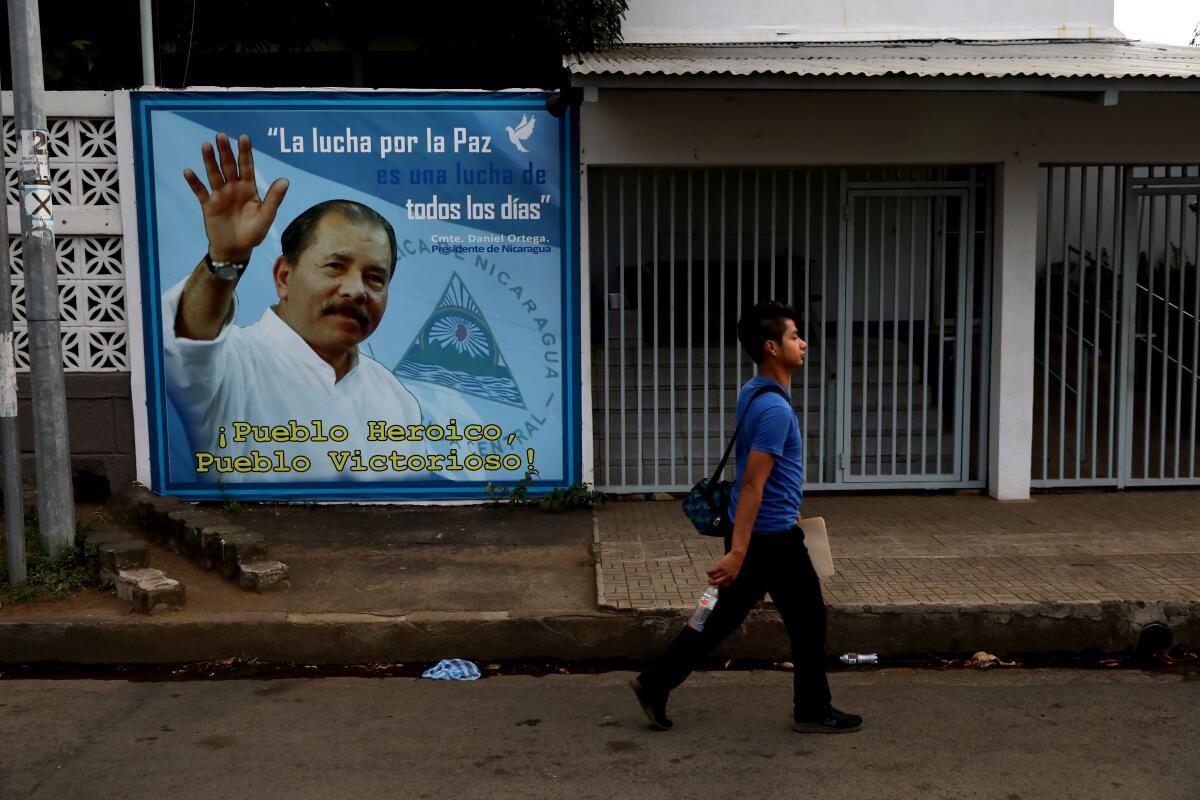Op-Ed: To replace autocrats of Nicaragua, think beyond this fall’s election

- Share via
Nicaragua’s presidential election scheduled for November was always unlikely to be free and fair, and a crackdown since June has confirmed that. But the opposition and the international community must continue to fight the ruling regime on two fronts.
The immediate priorities are freeing political prisoners and reestablishing freedoms of speech and the press. Looking beyond November, the nation needs long-term plans not only to restore democracy, but also to develop a positive, unifying vision for Nicaragua’s future. Further autocratic escalation this month only underscores the need to move past the regime of Daniel Ortega, who returned to the presidency in 2007, and Rosario Murillo, who is both first lady and vice president.
On Aug. 2, former beauty queen Berenice Quezada registered as the vice-presidential candidate for a conservative coalition. Although only a political novice on a ticket with little popular support, she was arrested two days later on spurious charges of inciting violence, sidelining her from the elections. The U.S. State Department declared the regime had “sunk to new depths of desperation,” having already arrested seven leading presidential contenders and dozens of other opposition figures. Quezada and her running mate were the only opposition candidates registered, but even this was unacceptable: The government has now revoked their party’s legal status.
Arrests have continued, as have government efforts to silence the remaining independent free press. Ortega’s government cut off supplies needed to sustain the print edition of the country’s oldest newspaper, La Prensa, and then on Aug. 13 raided and ransacked its offices, arresting publisher Juan Lorenzo Holmann.
Considering the climate of oppression leading up to this year’s sham elections, attention needs to shift decisively to 2022 and beyond.
First, Nicaragua’s fragmented opposition, which was unable to pick a unity candidate for 2021, must unite. The organizing capabilities of civil society and opposition political parties, under duress for years, must be buttressed and combined to continue challenging the regime long-term. To forge greater unity among the opposition, not just on unseating Ortega and Murillo, political leaders must offer ideas for what kind of country Nicaragua should be. The ruling family has erected a kleptocratic commercial empire, so Nicaragua needs to rebuild a state and an economy that serve everyone, especially the poor majority.
While visions for the future and plans of action must come from Nicaraguans themselves, international support is critical.
The Biden administration and the international community have condemned the recent electoral crackdown, and the U.S., the European Union and Canada increased targeted sanctions against government officials, the Ortega-Murillo family and regime-linked businesses. On Aug. 6, the Senate passed the Renacer Act, providing for further sanctions, alongside increased human rights monitoring and corruption investigations into the ruling family’s kleptocracy.
Member states of the International Criminal Court could also seek an investigation into crimes against humanity committed in 2018, when the regime mercilessly crushed pro-democracy protests, killing more than 300 people, imprisoning thousands and sending many more fleeing abroad.
By seeking negotiations recently, left-leaning governments in Argentina and Mexico took softer approaches than the U.S. push for sanctions, but Ortega and Murillo rebuffed them.
Latin American and Caribbean countries would have more influence if they could present a unified, regional response to Nicaragua’s authoritarian consolidation. The Organization of American States and the Central American Integration System have not suspended Nicaragua, despite the government clearly violating the democratic principles in their charters. Their concerted rejection of Ortega and Murillo’s electoral farce would send a strong regional signal.
Alongside such diplomatic moves, international actors should consider possibilities for further economic actions, such as restricting loans from multilateral banks and suspending Nicaragua from free trade agreements with the U.S. and the European Union. These measures would pressure the regime and squeeze complicit business elites — yet they must be approached cautiously to avoid deepening Nicaragua’s economic crisis and harming ordinary people.
Certainly, the troubled history of U.S. intervention in Nicaragua must inform how the international community supports democracy now and in the future. While Ortega and Murillo constantly decry U.S. imperialism as the source of the country’s ills, they have also angled to negotiate exclusively with Washington. Rather than rewarding the ruling couple’s hostage-taking strategy, though, there is an opportunity for the U.S. to instead support diplomatic and economic solutions and peacefully work toward restoring Nicaragua’s democracy.
Unfortunately, the electoral route out of Nicaragua’s authoritarianism has been strangled by Ortega and Murillo — for now. Yet the nation is not stuck or hopeless. Sustained pressure and long-term planning should take place now, so the regime’s grip will weaken and so that Nicaraguans will be ready to reclaim their country.
Kai M. Thaler is an assistant professor of global studies at UC Santa Barbara. Ryan C. Berg is a senior fellow in the Americas program at the Center for Strategic and International Studies.
More to Read
A cure for the common opinion
Get thought-provoking perspectives with our weekly newsletter.
You may occasionally receive promotional content from the Los Angeles Times.











